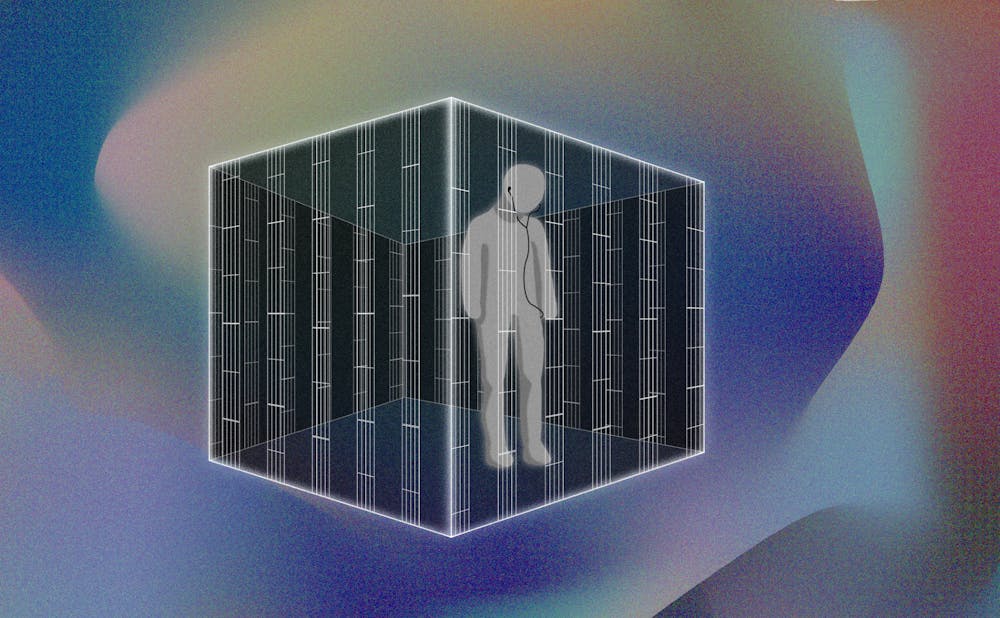Early last semester, the sound became a little too much to bear. Shuffling back to my room against the jetstream to South Campus where my friends partied on through the night, I passed the cars sauntering down Thayer, trunks bumping along with their hefty subwoofers. For the first few weeks I was in Providence, I appreciated that noise, be it from Thayer or oversized dorm speakers; it reminded me that I was a college student, and in a city too—albeit a small one. But that night, I ran away, my head pounding from the noise and internal dialogue. Closing the door on my room didn’t help; the symphony of adult life modulated into cacophony. So I fought sound with even more sound; that was the first night I put up my own wall of music to fall asleep.
I should say that it was the first night in a while that I had built this wall. The last time was during my seventh grade stint at sleepaway camp where missed opportunities brought out my most cliché adolescent fears of alienation. My first time alone and away from home promised excitement. The idyllic camp experience in my mind was a summer of stolen glances and middle school daydreams. Unfortunately, all of that crumbled as my expectations were overtaken by homesick, emotional outbursts; for the first time, I found myself bawling for no reason. The week of anticipated firsts brought with it an unexpected one: insomnia. Stifling tears as I tried not to wake up my roommate whom I didn’t even know, my thoughts kept me up. In full existential pre-teen angst, I shuffled 808s and Heartbreak in between free Spotify ads as I drifted off.
The persistent kick drums of “Say You Will” and “Street Lights” built walls around my insecurities, pushing them behind these covers—out of sight and out of mind by the time I awoke. When I got back home, I forgot to tear them down—in fact I forced myself not to, determined to hide that snotty, self-pitying, angry person somewhere he couldn’t come out from again. That whole summer, whenever my insecurities seeped through the cracks, I patched them up, and napped to Kanye’s auto-crooned vocals and reverberated synths.
For the majority of the six years since that first time, I’ve kept those thoughts closed off, covering the lid on my popcorning thoughts. I don’t like to open it because then I’m forced to talk with myself, and that’s when my fears come out. Plus, I haven’t needed to in so long. Throughout high school, I got by with my happy-go-lucky facade—so much so that I forgot what was behind it.
Simply put, I’m not very good at leaving my childhood home—or rather, the emotional comfort it offers. There, the walls are soft hues of cream and taupe. When I’m away, those white tones become drab and depressive. The warm bricks of my home’s long dormant fireplace are replaced by the camp’s cracked, foreboding ones. More than anything, the sound pierces through these unknown walls and into my head. Sure, home was plain, but it offered protection from seeing myself grow up.
Unfortunately, at college, these foreign, cracked walls bore witness to my growth, but I didn’t want to be seen—rather, I didn’t want to see the growth myself.
Lying awake in my dorm room, in the midst of a new first-away-from home, the minutiae of freshman life took over. You should’ve done more on the train, now you’re behind. Why go out—you’re not having fun. You haven’t talked to your parents in weeks, shouldn’t you call them? And soundtracking the internal monologue, the sounds of the world—the drunken chatter below my window, the amicable laughter echoing down the hall, even the sharp ch-ch-ch of my roommate's Ticonderoga flittering across the page—filtered as if through a megaphone. For the first time in a long time, the noise was getting through.
So I built my walls up again just like I did that summer so long ago, and put my earbuds in—this time with noise cancellation built in.
It quickly became a need. Night after night, I’d put on my playlist and let Phoebe Bridgers take me to the nostalgia-tinted gas stations, arcades, and payphones of Kyoto while flipping off her father. Sometimes Lana Del Rey transported me to California as we reminisced about the grand ol’ American love story. Then I’d be Leaving LA with Father John Misty as he rambled on about something that I truly couldn’t stay awake for. When I really needed an escape, I’d surf the Andromeda galaxy with Weyes Blood, and reflect on the stars. All of this trying to put a name to the looking glass self dread that Bo Burnham classifies as That Funny Feeling.
A funny feeling was truly all I could understand. Every day I turned myself up to a thousand, but I couldn’t shake this nagging questioning voice that poked accusatory holes in my fake persona. So every night took me away to a home where those questions may not have had answers, but at least had sympathizers offering warm hugs and soft pats on the back with their breathy, melancholy stories just outside the bounds of my reality. As I lay listening to them turn their frustrations into subtext, long for movie romance, and wax poetic about issues grander than any of us, I refocused the lens from my issues onto theirs. Floating off into inconsequential dreams and deep sleep, the issues clawing at my inner walls were reeled back in.
At least until the RIPTA’s stop announcement grounded me back in my dorm room. And the noise started again. Unlike that summer that coddled me to keep building walls, every day here brought with it new questions I had to ask myself, and in doing so, issues I had to confront directly. However, after years of running on autopilot by closing myself off to the relationships and habits that bothered me, I’d lost the ability to verbalize how I felt. Instead of letting the monster out and talking to it, I’d overwhelmed it with noise.
There came a point where I couldn’t put the music away, putting in my earbuds before I even stood up to leave class, and not taking them out until I sat down again. To a certain extent, I wasn’t even listening to it, just using the repetitive house beats, or bass heavy trap, or softer plucky guitars to drown out anything I didn’t want to face. Solid walls of sound helped me cope, but weren’t sustainable; I started closing myself off to others too. Plus, I came to college to meet people, and try new things, and find myself—whatever that means. To do so, these walls had to come down.
This past week, I’ve worked to turn off my own music and let the noise envelop me. My first and second concerts had me moshing and grooving, two things the voice from earlier would’ve criticized. I learned to eat by myself without fear, taking the chance to pause and think about the little victories and losses of the day. Then I met my friends where they were at their loudest, showcasing their material, vocal, and instrumental talents. Most importantly, I took out the earbuds in bed, demolishing my nighttime walls and embracing the sounds and firsts that the world threw at me.
Without the walls my dreams toss and turn, but the days offer more rewards and chances to reflect on what I’m beginning. The inner monologue is returning—perhaps that’s a good thing; it’s been so long—too long—since I’ve sat with my thoughts. Still, I know I can turn to the noise when I need it, but until then, I’ll continue to turn my walls into windows, and reopen the conversation I’ve so long neglected.

Joe Maffa is the editor-in-chief of post- Magazine. He studies CS and enjoys collecting cute trinkets, doing crosswords and cooking!





